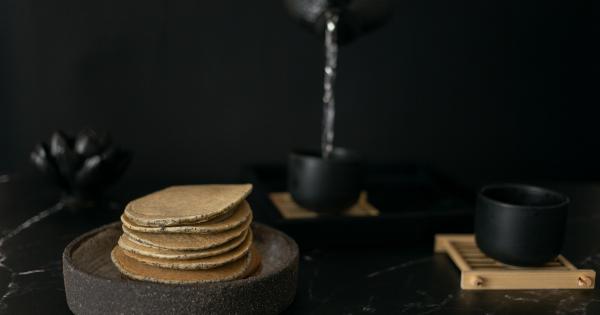Tea is a popular beverage enjoyed by many people around the world. From green tea and black tea to oolong tea and white tea, there are a plethora of tea varieties available, each with their unique benefits.
One of the most frequently touted benefits of tea is its potential to boost metabolism and burn calories. In this article, we will explore whether certain teas have a higher calorie-burning effect than others.
Green Tea
Green tea is often considered to be one of the healthiest teas available. It is made from unfermented tea leaves, which means it retains more of its natural antioxidants and polyphenols.
These compounds have been shown to have numerous health benefits, including a potential to aid in weight loss.
A study published in the American Journal of Clinical Nutrition found that consuming green tea extract led to a significant increase in energy expenditure (calorie-burning) and fat oxidation (fat-burning) over a 24-hour period.
The study participants who consumed green tea extract burned an average of 183 more calories per day than those who did not.
Another study published in the International Journal of Obesity showed that green tea supplementation can lead to a reduction in body weight and body fat percentage.
The study found that participants who took green tea supplements for 12 weeks had a significant decrease in BMI (body mass index) and waist circumference compared to those who took a placebo.
Overall, green tea appears to have a moderate calorie-burning effect, making it a useful addition to a weight loss or weight maintenance plan.
Black Tea
Black tea is the most commonly consumed tea in the Western world. It is made from fully fermented tea leaves and has a bold, robust flavor.
While black tea is not typically associated with weight loss, some studies suggest that it may have a small calorie-burning effect.
A study published in the European Journal of Clinical Nutrition found that consuming black tea extract led to a small increase in energy expenditure (calorie-burning) over a 24-hour period.
The study participants who consumed black tea extract burned an average of 50 more calories per day than those who did not.
While 50 calories per day may not seem like a significant amount, over time, it can add up and contribute to weight loss.
However, it is worth noting that this study was conducted with an extract, not brewed tea, so the results may not be directly applicable to those who drink black tea as a beverage.
Oolong Tea
Oolong tea is a partially fermented tea that falls somewhere between green tea and black tea in terms of flavor and processing.
It is most popular in China and Taiwan, but its popularity is growing in other parts of the world due to its potential health benefits.
While most studies on oolong tea and weight loss have been done in animals, one study published in the Chinese Journal of Integrative Medicine found that oolong tea consumption led to a reduction in body weight and body fat percentage in obese adults.
The study participants who consumed oolong tea for six weeks had a significant decrease in BMI and waist circumference compared to those who did not.
However, the calorie-burning effect of oolong tea is still largely unknown, and this study did not measure energy expenditure directly. More research is needed to determine whether oolong tea has a direct impact on calorie burning.
White Tea
White tea is the least processed and most delicate of all the teas, made from the youngest tea leaves and buds. While it is often praised for its high antioxidant content, there is little scientific evidence to support its use for weight loss.
One study published in the journal Nutrition and Metabolism found that white tea extract supplementation led to a small decrease in body weight and waist circumference in obese rats.
However, more research is needed to determine whether these findings can be applied to humans, and the calorie-burning effect of white tea is still largely unknown.
Mint Tea
Mint tea is not technically a tea, but rather an infusion made from dried or fresh mint leaves. It is commonly consumed for its refreshing flavor and digestive benefits, but it may also have a small calorie-burning effect.
A study published in the Journal of the International Society of Sports Nutrition found that consuming peppermint tea led to a significant increase in energy expenditure (calorie-burning) and fat oxidation (fat-burning) during exercise.
The study participants who consumed peppermint tea burned an average of 190 more calories during exercise than those who did not.
While this study was conducted during exercise and may not necessarily translate to daily life, it does suggest that mint tea may have a small calorie-burning effect that could be beneficial for weight loss.
Ginger Tea
Ginger tea is another popular herbal tea often consumed for its digestive benefits. However, it may also have a small calorie-burning effect.
A study published in the European Journal of Nutrition found that consuming a high-dose ginger supplement led to a significant increase in energy expenditure (calorie-burning) and fat oxidation (fat-burning) over a 24-hour period.
The study participants who consumed the high-dose ginger supplement burned an average of 43 more calories per day than those who did not.
While ginger tea may not have as potent of a calorie-burning effect as a high-dose supplement, it may still contribute to overall weight loss efforts.
Rooibos Tea
Rooibos tea (also known as red tea or bush tea) is a caffeine-free herbal tea made from the leaves of a South African plant.
While it is not traditionally associated with weight loss, some studies suggest that it may have a positive impact on metabolism.
A study published in the journal Phytomedicine found that rooibos tea had a small but significant effect on glucose metabolism in overweight adults.
The study participants who consumed rooibos tea showed improved insulin sensitivity and glucose tolerance compared to those who did not.
While rooibos tea may not have a direct calorie-burning effect, it may still be beneficial for overall metabolic health and weight management.
Hibiscus Tea
Hibiscus tea is a popular herbal tea made from the dried flowers of the hibiscus plant. It is often consumed for its fruity flavor and potential health benefits, which may include a small impact on calorie burning.
A study published in the Journal of Food Science and Technology found that hibiscus tea extract led to a small increase in energy expenditure (calorie-burning) and fat oxidation (fat-burning) over a six-week period.
The study participants who consumed hibiscus tea extract burned an average of 28 more calories per day than those who did not.
While the calorie-burning effect of hibiscus tea may be small, it may still be a beneficial addition to a weight loss or weight maintenance plan.
Conclusion
While some teas may have a small impact on calorie burning and weight loss, they are not a magic solution for weight-related issues.
However, incorporating tea into a balanced diet and exercise program can be a useful tool for overall health and wellness.
It is worth noting that many of the studies on tea and weight loss have been done with extracts or supplements, which may not provide the same benefits as brewed tea.
Additionally, individual results may vary depending on factors such as diet, exercise, and individual metabolism.
To get the most benefits from tea, it is best to choose high-quality, whole-leaf teas and brew them in a way that extracts the most flavor and nutrients.
Experimenting with different varieties and brewing methods can also make tea drinking a more enjoyable and sustainable habit.































